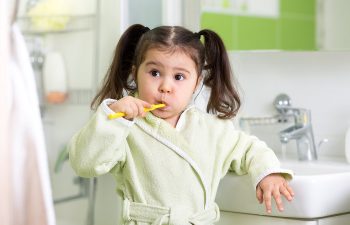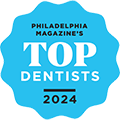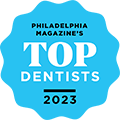
Baby teeth, also known as primary teeth, are an essential part of early childhood development. At The Pediatric Dental Team, we emphasize the importance of caring for these first teeth, not just for a healthy smile today but for strong oral health in the future. While many parents understand that baby teeth are important, there are some surprising facts about them that you might not know. Here’s a look at some interesting and lesser-known facts about baby teeth that highlight their significance.
1. Baby Teeth Begin Developing Before Birth
Did you know that your child’s baby teeth actually start forming while they’re still in the womb? Although they don’t make their debut until around six months of age, the development of primary teeth begins as early as the sixth week of pregnancy. By the time your baby is born, all 20 primary teeth are already formed beneath the gums, waiting for the right time to emerge.
2. Baby Teeth Hold Space for Permanent Teeth
One of the most critical roles of baby teeth is to hold space for their adult counterparts. Each primary tooth acts as a placeholder, guiding the permanent teeth into their correct position when they’re ready to erupt. If a baby tooth is lost too early due to decay or injury, it can lead to spacing issues or misalignment as permanent teeth start to come in. This can result in the need for orthodontic treatment later on.
3. Healthy Baby Teeth Help with Speech Development
Baby teeth do more than just assist with eating—they play a significant role in helping children learn how to speak clearly. The position and structure of the front teeth, in particular, contribute to the pronunciation of certain sounds. When baby teeth are healthy and in place, they support proper speech development and allow children to form words accurately.
4. Cavities in Baby Teeth Are More Common Than You Think
Many parents are surprised to learn that cavities, or early childhood caries (ECC), are the most common chronic childhood disease. According to the Centers for Disease Control and Prevention (CDC), more than 40% of children have some form of tooth decay by the time they reach kindergarten. Baby teeth are more susceptible to cavities because the enamel on primary teeth is thinner than that of adult teeth, making them more vulnerable to decay.
Regular dental check-ups and proper oral hygiene can go a long way in preventing cavities.
At The Pediatric Dental Team, we provide guidance on how to establish a good dental care routine from an early age to keep your child’s smile healthy and cavity-free.
5. Baby Teeth Can Impact Overall Health
Oral health is closely linked to overall health, even in young children. If a baby tooth becomes decayed or infected, it can lead to more severe issues like pain, difficulty eating, and even infections that can spread to other parts of the body. Maintaining healthy baby teeth through proper brushing, flossing, and regular dental visits can help ensure your child stays healthy and happy.
6. The First Baby Tooth Typically Appears Around Six Months
While every child is different, the first baby tooth usually appears when a baby is around six months old. The most common first teeth are the lower central incisors (the bottom front teeth). By the age of three, most children will have their full set of 20 primary teeth.
7. Baby Teeth Fall Out in a Predictable Pattern
Primary teeth fall out in a similar pattern to how they come in. Typically, the lower front teeth are the first to go, followed by the upper front teeth. This process generally begins around age six and continues until about age 12, when the last baby teeth fall out and are replaced by permanent teeth.
8. Thumb Sucking and Baby Teeth
Thumb sucking is a common habit among infants and young children, but prolonged thumb sucking can affect the alignment of baby teeth and even the development of the jaw. Most children naturally stop thumb sucking between the ages of two and four, but if the habit persists, it may require gentle intervention to prevent potential dental issues.
9. Baby Teeth Have a Shorter Lifespan but Long-Lasting Impact
It’s easy to think of baby teeth as temporary and less important than permanent teeth. However, the health and care of baby teeth have a lasting impact on your child’s dental health. Establishing good oral hygiene practices early sets the foundation for a lifetime of healthy teeth and gums.
How to Keep Baby Teeth Healthy
At The Pediatric Dental Team, we encourage parents to start dental care as soon as the first tooth appears. Here’s how to maintain healthy baby teeth:
- Brush Twice a Day: Use a child-sized toothbrush with fluoride toothpaste to gently clean your child’s teeth twice a day.
- Floss Daily: Once two teeth touch, begin flossing between them to remove plaque and prevent cavities.
- Limit Sugary Drinks and Snacks: Sugary substances can lead to decay, so try to limit sugary snacks and encourage water between meals.
- Visit the Dentist Regularly: Schedule dental check-ups starting by your child’s first birthday and continue every six months for routine exams and cleanings.
Visit The Pediatric Dental Team for Comprehensive Care
At The Pediatric Dental Team in Philadelphia, we’re dedicated to providing exceptional pediatric dental care and ensuring your child’s baby teeth stay healthy. If you have questions or would like to schedule a dental appointment for your little one, contact us today. We’re here to support your family and help your child build a foundation for lifelong oral health.
Posted on behalf of
2010 South Juniper Street
Philadelphia, PA 19148
Phone: 215-334-3490
Mon: 8:00AM – 4:30PM
Tues: 8:00AM – 4:30PM
Wed: 8:00AM – 4:30PM
Thu: 8:00AM – 4:30PM
Fri: 8:00AM – 1:00PM









